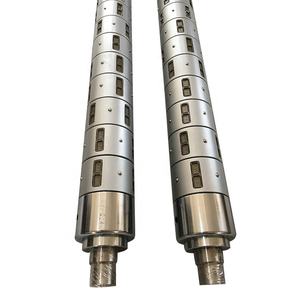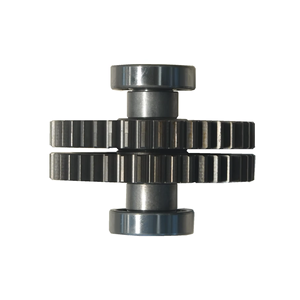PRODUCT PARAMETERS
Description
Introduction to High-strength Ship Propeller Shaft Alloy Ring Forgings 1.4418/X4CrNiMo16-5-1
High-strength Ship Propeller Shaft Alloy Ring Forgings 1.4418/X4CrNiMo16-5-1 are important components in mechanical systems used to support rotating parts (such as gears, pulleys or sprockets) and transmit torque. They play a key role in mechanical equipment by connecting the power source with the working parts to ensure the effective transmission of power.
Characteristic advantages of High-strength Ship Propeller Shaft Alloy Ring Forgings 1.4418/X4CrNiMo16-5-1
High precision: adopting precision machining technology ensures the size and shape accuracy of the shaft and improves the transmission efficiency.
High strength: made of high-quality materials with good tensile, compressive and wear-resistant properties.
Reliability: After strict quality control, it ensures stable operation for a long time.
Versatile design: A variety of specifications and types are available to suit different applications.
Easy maintenance: the structure is designed for easy installation and repair, reducing maintenance costs.

(High-strength Ship Propeller Shaft Alloy Ring Forgings 1.4418/X4CrNiMo16-5-1)
Specification of High-strength Ship Propeller Shaft Alloy Ring Forgings 1.4418/X4CrNiMo16-5-1
High-strength ship propeller shaft alloy ring forging is an essential component in the design and production of modern naval vessels. These rings are made from a combination of high-strength materials that provide maximum strength and durability under stress, while still maintaining compliance with the necessary standards for marine use.
One of the key factors that contribute to the performance of high-strength ship propeller shaft alloy ring forging is the material used. This can be either aluminum or steel, but both have their advantages and disadvantages. Aluminum offers good corrosion resistance and lightweight, making it a popular choice for various applications. However, it can also be more prone to fatigue cracking under load, which can affect the lifespan of the components.
On the other hand, steel is known for its exceptional strength and toughness, making it ideal for high-stress applications. It is also more resistant to corrosion and wear than aluminum, which makes it a cost-effective option for many ship propeller shaft forging requirements. Additionally, steel has a higher melting point than aluminum, which helps to prevent overheating during manufacturing processes.
In addition to the material used, the specification of high-strength ship propeller shaft alloy ring forging also includes considerations such as the size and shape of the forging patterns, the number and type of heat treatment processes used, and the desired Finish (such as flatness, roundness, and finish radius).
Overall, specification of high-strength ship propeller shaft alloy ring forging involves carefully selecting the right materials, designing suitable forging patterns, and following proper heat treatment processes to achieve optimal strength and performance characteristics. By doing so, ship owners and designers can ensure that their propeller shafts are reliable, durable, and capable of withstand the rigorous demands of naval operations.

(High-strength Ship Propeller Shaft Alloy Ring Forgings 1.4418/X4CrNiMo16-5-1)
Applications of High-strength Ship Propeller Shaft Alloy Ring Forgings 1.4418/X4CrNiMo16-5-1
High-strength ship propeller shaft alloy ring forgings is a critical component that plays a vital role in ensuring the reliability and performance of various types of powerboats, yachts, and naval vessels. These alloys are designed to withstand the extreme operating conditions, such as high temperatures, sea pressures, and mechanical stresses, while maintaining excellent strength, wear resistance, and corrosion resistance.
The applications of high-strength ship propeller shaft alloy rings forgings include:
1. InnerShaft Rings: These rings are used to replace worn-out or damaged inner shafts on boats and yachts. They can be made from high-strength aluminum or stainless steel, depending on the specific requirements of the application.
2. OuterShaft Rings: These rings are used to replace worn-out or damaged outer shafts on boats and yachts. They can be made from high-strength aluminum or stainless steel, depending on the specific requirements of the application.
3. Engine Shafts: These rings are used to replace worn-out or damaged engineshafts on boats and yachts. They can be made from high-strength aluminum or stainless steel, depending on the specific requirements of the application.
4. Propellers: These rings are used to install propellers on boats and yachts. They can be made from high-strength aluminum or stainless steel, depending on the specific requirements of the application.
One of the most important benefits of using high-strength ship propeller shaft alloy rings forgings is their excellent strength-to-weight ratio. This means that these rings can support the weight of the propeller without sacrificing its structural integrity. Additionally, they are resistant to corrosion and wear, which helps to prolong the life of the propeller.
Another benefit of these rings is their easy installation and removal process. They can be installed quickly and easily, making them ideal for maintenance and repair purposes. Furthermore, they are compatible with a wide range of。
In conclusion, high-strength ship propeller shaft alloy rings forgings are essential components that play a crucial role in ensuring the reliable and performance of various types of powerboats, yachts, and naval vessels. These rings are available in a variety of sizes and materials, allowing。 With proper selection and installation, these rings can help you maximize the efficiency and longevity of your boat’s propulsion system.
Company Introduction
Established in 2002, Port of Machinery Co.,ltd. focus on metal research and mining machinery spare parts. 2 factories over an area of 13,300 square meters, based on 100+ sets of equipment, our production capacity reaches 12000 Tons/Year. has passed ISO 9001 quality managment system certification in 2008.
Our mainly products are dragline excavator spare parts,rotary kiln spare parts, large modulus gear (gear shaft), gearbox ect. 40+ patents with over 45 years experience to help focus on improve the service life of spare parts. We belive that more than 80% reason of mechanical parts’ working life depends on hot processing (steel making/forging/casting/welding/heat treatment). Eight material engineers will control the quality from the original resource.
If you are interested, please feel free to contact us.
Payment
L/C, T/T, Western Union, Paypal, Credit Card etc.
Shipment
By sea, by air, by express, as customers request.
5 FAQs of High-strength Ship Propeller Shaft Alloy Ring Forgings 1.4418/X4CrNiMo16-5-1
High-strength ship propeller shaft alloy ring forging is an essential component in ensuring the longevity and reliability of ship propulsion systems. It is crucial to choose the right forging alloy for your application, as different alloys have different strengths and weaknesses. Here are five frequently asked questions about high-strength ship propeller shaft alloy ring forging:
1. What is the difference between high-strength forging alloying and low-strength forging alloying?
* High-strength forging alloying involves using a higher percentage of alloy (ferrous metal) than low-strength forging alloying.
* This allows for a stronger, more durable part that can withstand the stresses and pressures of high-speed operation.
2. How do high-strength forging alloys compare to other forging alloys?
* Some forging alloys may be more brittle or prone to cracking under stress, while others may be stronger but less durable.
* The choice of forging alloy will depend on the specific requirements of the part being forged and the intended use.
3. What are some common applications of high-strength forging alloys?
* These alloys are often used in manufacturing naval vessels, heavy equipment, and defense systems due to their strength and durability.
* They are also commonly used in engine parts, such as propellers and fans, where they provide maximum power output without sacrificing weight.
4. How does high-strength forging help prevent corrosion?
* High-strength forging creates a strong, durable surface on the part being forged that helps prevent rust and other forms of corrosion.
* This is achieved through the use of special finishes, such as heat treatment or anti-corrosion coatings.
5. What are some potential challenges associated with high-strength forging?
* Some forging processes may require specialized equipment and expertise, making it more difficult to find qualified suppliers and manufacturers.
* Additionally, high-strength forging can be more expensive than traditional forging methods, which may limit its availability for certain applications.

(High-strength Ship Propeller Shaft Alloy Ring Forgings 1.4418/X4CrNiMo16-5-1)
REQUEST A QUOTE
RELATED PRODUCTS
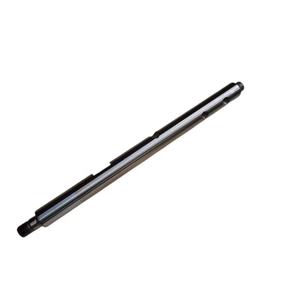
Stainless steel CNC lathe machining milling customized non-standard parts high-precision machining Threaded Step Eccentric Shaft
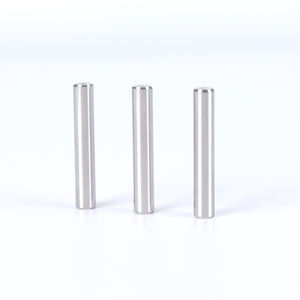
Twin Screw Shaft and Screw Elements for second hand plastic extruder machine
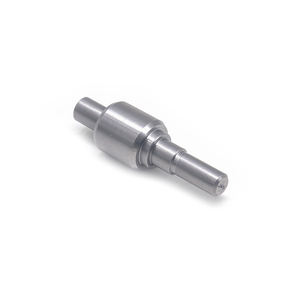
CCL CV Joint 43460-80001 for Toyota Joint kit Drive Shaft CV Joint Outer CV Joint Shaft Assy Front Drive Outboard Joint

Shaft and Wheel TF08L 1100-016-105 / 1100-016-105 49134-00020 9 blades k18

Propeller cardan shaft 37100-0K030 37100-0K040 for Toyota Hilux VIGO KUN26 4WD 2005-
